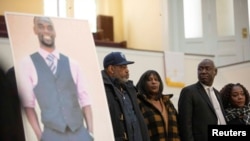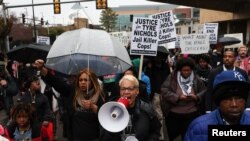More than an hour long video released by Memphis police last week shocked the nation and angered protesters who took to major cities over the weekend to protest yet another killing of a Black man at the hands of law enforcement officials.
In the video, Nichols could be heard calling out for his mother after officers stopped him for "reckless driving," an allegation local police chief Cerelyn Davis said has yet to be proven.
The five officers — all Black men — have been fired and charged with murder among other charges by the Shelby County District Attorney Steve Mulroy.
Now, U.S. activists and legislators are trying to figure out how to move forward after Nichols' death.
Appearing on ABC’s "This Week," the family’s attorney, Ben Crump, stressed the need to address what he called an implicit bias in police culture in the United States.
“It doesn’t matter if the officers are Black, Hispanic or white. I believe its part of the institutionalized police culture that makes it somehow allowed that they can use this type of excessive force and brutality against people of color,” he said.
But there isn’t consensus yet among American legislators on to how to prevent more violence particularly on Black Americans.
When assessing concrete measures to prevent police brutality, Democratic Senator Dick Durbin told ABC a national conversation is needed.
“Banning chokeholds, dealing with no warrantless searches, dealing with accreditation of police departments. It’s necessary that we do all these things but not sufficient,” Senator Durbin said.
Speaking on NBC's "Meet the Press," Republican Representative of Ohio Jim Jordan stressed that while not all police officers are to be blamed, calls for police reform at the federal level is not the answer.
“I don’t know that any training, any ban, there was no chokeholds used there, what they did there was just continue to beat Mr. Nichols, so I don’t know that’s the answer,” he said.
“Agencies must be trained around deescalating but also we need to beef up the funding for mental health support,” Derrick Johnson, president of the National Association for the Advancement of Colored People (NAACP), told ABC's "Good Morning America."
Johnson added that having a federal database where police misconduct is recorded could also block officers from changing agencies, and thus help make a difference.







